|
|
|
Sort Order |
|
|
|
Items / Page
|
|
|
|
|
|
|
| Srl | Item |
| 1 |
ID:
138955
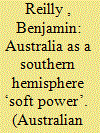

|
|
|
|
|
| Summary/Abstract |
The 2014 Group of 20 (G20) leaders’ meeting in Brisbane was hailed as the largest gathering of international leaders ever held in Australia. While media attention was focused on the presidents of great powers of the northern hemisphere—the USA, China and Russia in particular—the meeting also featured the first Australian gathering of the major powers of the southern hemisphere, including Argentina, Brazil, Indonesia, South Africa and, of course, Australia itself.
|
|
|
|
|
|
|
|
|
|
|
|
|
|
|
|
| 2 |
ID:
184768
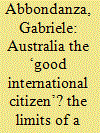

|
|
|
|
|
| Summary/Abstract |
Australia is often described as a ‘good international citizen’ (GIC), which is intertwined to its status of ‘quintessential’ middle power. However, a number of elements might undermine both notions. This research reviews the concept of GIC and contributes to this niche of IR theory by providing a dedicated definitional framework, which consists of: i) the respect of the international law; ii) multilateralism; iii) the pursuing of humanitarian and idealist objectives; iv) an active support for the rules-based order; and v) a congruous identity matched by consistent domestic policies. After assessing the country’s foreign and domestic policies against this, it finds that Australia has damaged its GIC credentials due to a number of reasons, including: the hard-line policies against seaborne asylum seekers; the participation in missions that are not sanctioned by the UN; the transformation of its global multilateralism into a selective regionalism; the budget cuts to foreign aid; a controversial attitude towards climate change mitigation; and a preference for the US-led global order over a rules-based international society. Far from criticising the country’s foreign policy in its entirety, it argues that in the 21st century Australia behaves as a ‘neutral international citizen’, and a traditional but not ‘quintessential’ middle power.
|
|
|
|
|
|
|
|
|
|
|
|
|
|
|
|
| 3 |
ID:
108149
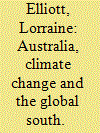

|
|
|
|
|
| Publication |
2011.
|
| Summary/Abstract |
Australia's climate change relationship with developing countries is framed by the 1992 United Nations Framework Convention on Climate Change and the 1997 Kyoto Protocol. Under those agreements, Australia has committed to take a lead in cutting greenhouse gas emissions and to provide technological and financial support to developing countries. In practice, Australian governments of both political hues have adopted a somewhat ambiguous and ambivalent attitude to developing countries within climate change politics and their fulfilment of those commitments has been uneven. This is particularly so if the concept of the 'Global South' is expanded from developing countries to include those people who are vulnerable to the environmental, social and economic impacts of climate change.
|
|
|
|
|
|
|
|
|
|
|
|
|
|
|
|
| 4 |
ID:
181941
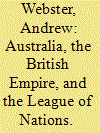

|
|
|
|
|
| Summary/Abstract |
This article reviews the most recent volume in the series of archival document collections on the history Australia’s external affairs, Documents on Australian Foreign Policy, covering the years 1920 to 1930. It focuses upon two main themes of central importance to the Australian global presence in that decade: the organisation and purposes of the Empire-Commonwealth and the impact of the League of Nations.
|
|
|
|
|
|
|
|
|
|
|
|
|
|
|
|
| 5 |
ID:
158740
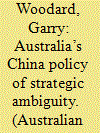

|
|
|
|
|
| Summary/Abstract |
History, little understood, shows that for 55 years a policy of ‘strategic ambiguity’ about the application of the Australia, New Zealand, United States Security Treaty to Taiwan, a flashpoint in Asia, served Australia well. Return to it could lessen the risks of embroilment in any Sino-American war in East Asia, and enhance Australia’s middle-power options.
|
|
|
|
|
|
|
|
|
|
|
|
|
|
|
|
| 6 |
ID:
175656
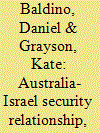

|
|
|
|
|
| Summary/Abstract |
While the Australia-Israeli relationship encompasses a cordial bilateral comradeship, it has not been without diplomatic skirmishes that have tested its reputation and strength. In particular, controversial intelligence liaisons coupled with recurring security-related scandals pose significant risks and challenges to Australian national interests. This article will explore the rationale, execution and hazards of the Australia-Israel intelligence relationship from an Australian perspective. When dealing with intelligence exchange across nations and information sharing with allies that might entail both formal and informal arrangements, it is argued that transparency and secrecy can co-exist when reconciled through robust, independent and well-resourced national oversight institutions. In an era of expanding globalisation of intelligence, targeted accountability advances that are adaptive to global trends may serve to mitigate the potential costs and downsides of transnational intelligence exchange while respecting the rights and liberties of citizens and ensuring that sovereignty, human rights standards and rule of law remain protected.
|
|
|
|
|
|
|
|
|
|
|
|
|
|
|
|
| 7 |
ID:
181939
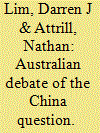

|
|
|
|
|
| Summary/Abstract |
Debate within Australia regarding the bilateral relationship with China is complex, contentious and often lacks clarity. Informed by basic international relations theory, we identify two dividing lines within this debate. First, whether understanding China’s behaviour is most effectively done through a unitary actor framework, or whether it is essential to look inside the ‘black box’ of the Chinese party-state. Second, whether one is more concerned about the ‘Thucydides trap’ or ‘Munich’—that is, are the consequences of an overreaction or an underreaction more concerning when interpreting China’s intentions and responding to perceived threats. These dividing lines generate four ideal-type policy viewpoints that we label Balancers, Hedgers, Engagers and Reformers, and apply in the Australian context. We then overlay our framework onto the public debate in Australia, selecting a specific bounded case study: commentary and analysis concerning China’s behaviour throughout the COVID-19 pandemic of 2020, in particular responding to Australia’s call for an international inquiry. Our objective is to progress an often circular debate by offering an accessible frame that clarifies and synthesises fundamental disagreements.
|
|
|
|
|
|
|
|
|
|
|
|
|
|
|
|
| 8 |
ID:
146522
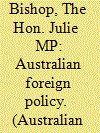

|
|
|
|
|
| Summary/Abstract |
Supported by one of the most professional and dedicated foreign policy bureaucracies in the world, one can rely on any Australian government that wins office to perform its duty to represent our country in a diligent and tireless manner. The difference lies in whether a government entering or returning to office is offering a credible vision of what the country’s most important national interests might be, and a sound and practical understanding of how best to advance such interests on behalf of the Australian population.
|
|
|
|
|
|
|
|
|
|
|
|
|
|
|
|
| 9 |
ID:
146523
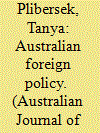

|
|
|
|
|
| Summary/Abstract |
Mainstream thinking accepts that the main tenets of Australian foreign policy are the US alliance, engagement with the Indo-Pacific and our global interests. We differ over emphasis and approach, but we are fortunate to have broad agreement on the component parts. This is one reason why foreign policy often plays a marginal role in Australian election campaigns—elections are designed to amplify difference. Foreign policy is most often about continuity and seeking common ground.
|
|
|
|
|
|
|
|
|
|
|
|
|
|
|
|
| 10 |
ID:
146524
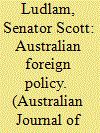

|
|
|
|
|
| Summary/Abstract |
Election campaigns are mostly argued on the basis of local issues that have direct impacts on our community—so much so that the phrase ‘all politics is local’ is considered self-evident. However, some things are missed in our three-year electoral cycle. The biggest gap in our national conversation is the place of Australia in the world. Foreign policy takes a back seat during an election, and if it presents at all, it is as caricature.
|
|
|
|
|
|
|
|
|
|
|
|
|
|
|
|
| 11 |
ID:
165204
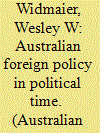

|
|
|
|
|
| Summary/Abstract |
Over the past century, Australian foreign policy orders have been stabilised by the construction of ideas that have reduced uncertainty regarding national interests. Yet, such ideas have often evolved in ways that have engendered misplaced certainty, renewed instability, and crisis. To explain such shifts, I highlight the role of an Australian ‘pragmatic liberal tradition’, one which has enabled alternating tendencies to principled stability or technocratic hubris. In a tripartite model, I trace stages over initial ‘middle power’ efforts to construct ideas that lead states—and particularly great powers—to identify interests in cooperation, misplaced certainty in great power ties which obscures new challenges, and the construction of crises that impede or enable change. Empirically, I apply this framework to the construction, conversion, and crises of the ongoing ‘Reform order’. These span the initial Hawke-era middle power integration of US and regional ties, Howard-era misplaced certainty in US-styled neoconservative bandwagoning and neoliberal macroeconomic accommodation, and evolving constructions of the War on Terror and Global Financial Crisis. In the conclusion, I address theoretical and policy implications, highlighting the initial challenges that crises can pose for middle power leadership, and the subsequent scope for creativity.
|
|
|
|
|
|
|
|
|
|
|
|
|
|
|
|
| 12 |
ID:
142226
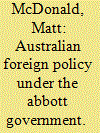

|
|
|
|
|
| Summary/Abstract |
While foreign policy featured prominently on the Australian political agenda in late 2014, the manner of Australia's engagement with the world challenges the idea of a ‘pivot’ from domestic politics to foreign policy. In particular, the government demonstrated a tendency to prioritise domestic political considerations, in particular public opinion, in its dealings with the outside world. This was evident across a range of issue areas: from the ‘internationalist’ agenda of asylum, climate change and aid to more traditional concerns such as bilateral relations with Indonesia and international security. This article explores these dynamics and asks what implications this has for both Australian foreign policy and theoretical accounts of the role and desirability of public engagement with foreign policy in international relations thought.
|
|
|
|
|
|
|
|
|
|
|
|
|
|
|
|
| 13 |
ID:
165203
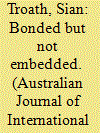

|
|
|
|
|
| Summary/Abstract |
The aim of this article is to use theories of bonded and embedded trust to explain the ‘roller-coaster’ nature of the Australia-Indonesia relationship. An examination of Prime Minister Keating and President Suharto as a case of bonded trust between leaders reveals the value such a relationship has in building trust in bilateral relations. However, it also reveals that such trust cannot survive changes in leadership if it has not become more broadly embedded in both government and society. This is particularly problematic given Australia’s tendency for rapid leadership and ministerial turnover across the past decade. While President Joko Widodo and Prime Minister Turnbull were able to develop a warm relationship which helped to reset the relationship and enabled them to navigate diplomatic incidents, Malcolm Turnbull’s recent political demise only serves to further highlight the necessity of building trust between societies. Without trust, cooperation between the two states will be limited. Building trust between societies will be required if Australia wants to develop a trusting relationship with Indonesia capable of undertaking deeper forms of cooperation on more sensitive issues – something which will be fundamental to Australia’s ability to navigate growing strategic uncertainty in the region.
|
|
|
|
|
|
|
|
|
|
|
|
|
|
|
|
| 14 |
ID:
107232
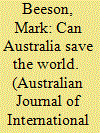

|
|
|
|
|
| Publication |
2011.
|
| Summary/Abstract |
Australian policymakers have always harboured a desire to 'punch above their weight'. On occasions they have succeeded. At a time when Australia's strategic, economic and environmental future is inextricably bound up with that of its immediate neighbours and the wider world, there are compelling reasons for hoping that they still can. This paper explores some of the most important aspects of Australian foreign policy during the Rudd era and asks whether the Australian government can play a constructive-even an exemplary-role in finding solutions for some of the planet's most pressing problems.
|
|
|
|
|
|
|
|
|
|
|
|
|
|
|
|
| 15 |
ID:
130163
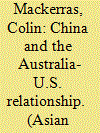

|
|
|
|
|
| Publication |
2014.
|
| Summary/Abstract |
This paper analyzes China's impact on Australia-U.S. relations from 1949 to 1996, including how far Australia's China policy followed the American lead. The conclusion: American influence was dominant, but Australia's own initiative was enough to belie the suggestion that it was no more than a blind follower.
|
|
|
|
|
|
|
|
|
|
|
|
|
|
|
|
| 16 |
ID:
119075
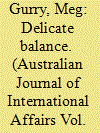

|
|
|
|
|
| Publication |
2013.
|
| Summary/Abstract |
The Australia-India relationship has pivoted on more than the sale of uranium, and is not purely a narrative of neglect. While there have been some periods where bilateral relations received inadequate attention, the years 1947 to 1980 tell of a more complex story. During this time, many Australian diplomats and leaders worked hard to include India in Australia's foreign policy calculations. However, it proved difficult, arguably impossible, to negotiate a path for the Australia-India connection through the complexities of the India-Pakistan relationship and the strategic uncertainties of this most fragile of regions. Indian leaders, not without cause, constantly accused Australia of a 'tilt' to Pakistan. An examination of the Australian archives for this period reveals the inhibiting effects of the India-Pakistan conflict, particularly over Kashmir, on the development of a more fruitful Australia-India collaboration.
|
|
|
|
|
|
|
|
|
|
|
|
|
|
|
|
| 17 |
ID:
131822
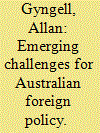

|
|
|
|
|
| Publication |
2014.
|
| Summary/Abstract |
For more than half a century, three broad objectives have formed the core of a bipartisan foreign policy consensus in Australia: support for the US alliance, the development of closer relations with Asia, and integration with a rules-based international order. Until now, we have lived in a world in which Australian governments have found it easy enough to keep all three in alignment. But that is changing. Foreign policy which, in Australia, has traditionally taken second place as a way of thinking about the world to security and defence policy is becoming more important and more complicated.
|
|
|
|
|
|
|
|
|
|
|
|
|
|
|
|
| 18 |
ID:
172237
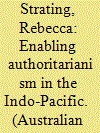

|
|
|
|
|
| Summary/Abstract |
In recent white papers, Australia has identified rising authoritarianism in the region as a key challenge to its regional security interests. Foreign policy discourses highlight Australia’s normative commitment to global democracy, and Australia engages in a range of democratic promotion activities. Democracy promotion by Western states has come under scrutiny by analysts of different ideological persuasions. Critics have framed American ‘exceptionalism’ as really meaning ‘exemptionalism’, referring to its capacities to create exceptions for itself and its own conduct on the global stage, particularly regarding democracy and human rights. This paper argues that this exemptionalism is not limited to the United States: Australia also engages in practices that have undermined its democracy promotion principles. In some cases, Australia’s policies have enabled authoritarianism to flourish unchecked. This paper uses Australia’s refugee policy and its effect on the small Pacific Island state of Nauru as a case study. It highlights how the securitisation of asylum seekers for electoral purposes has contributed to Australia carving out an exception for itself in both adherence to international refugee law and the promotion of democracy. It finds that formal democratic processes within Australia have produced undemocratic outcomes in foreign policy.
|
|
|
|
|
|
|
|
|
|
|
|
|
|
|
|
| 19 |
ID:
160931
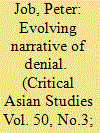

|
|
|
|
|
| Summary/Abstract |
As research by the Commission for Reception, Truth and Reconciliation in East Timor documents, the years 1975–1980 constituted the worst period of the Indonesian occupation of East Timor, during which grave human rights took place involving a high loss of life. In Australia, the government headed by Prime Minister Malcolm Fraser (1975–1983) sought to present itself as a supporter of human rights and the international rule of law. It also prioritized relations with the Suharto regime, which it saw as key to its policy position in Southeast Asia. These two positions came into conflict due to the Indonesian invasion of East Timor. The Fraser government therefore worked to propagate a narrative concerning East Timor which denied the seriousness of the situation, distorted the historical narrative, deflected blame from Indonesia, and depicted the Australian position as principled and realistic. This paper examines the development of this narrative as events progressed and information concerning the crisis in East Timor came to the attention of the outside world. It also examines how the Fraser government employed this narrative internationally in order to protect the Suharto regime from scrutiny.
|
|
|
|
|
|
|
|
|
|
|
|
|
|
|
|
| 20 |
ID:
148498
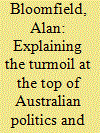

|
|
|
|
|
| Summary/Abstract |
Five Australian prime ministers have come and gone in the past five years. The turbulence at the top, however, is likely over because Malcolm Turnbull, the leader of the conservative Liberal Party, is likely to remain in the prime minister’s office for several years. This article first provides some background to the Australian political system before explaining why so prime ministers came and went between 2010 and 2015. It then considers the implications of all this for Australian foreign policy. The argument is simple: despite the constant personnel changes at the pinnacle of power there are actually few ‘deep’ differences between the two parties – or their leaders – in the realm of foreign policy. There are some differences, of course, so the final section considers the potential for changes in several policy-areas – climate change, national security, trade policy and asylum seekers – but any potential changes are judged likely to be minor and incremental. The article then finishes with consideration of what all of this means for India and, again, the conclusion is simple; it is likely to be ‘business as usual’ as Canberra tries to steadily improve the bilateral relationship in both security and economic terms.
|
|
|
|
|
|
|
|
|
|
|
|
|
|
|
|
|
|
|
|
|